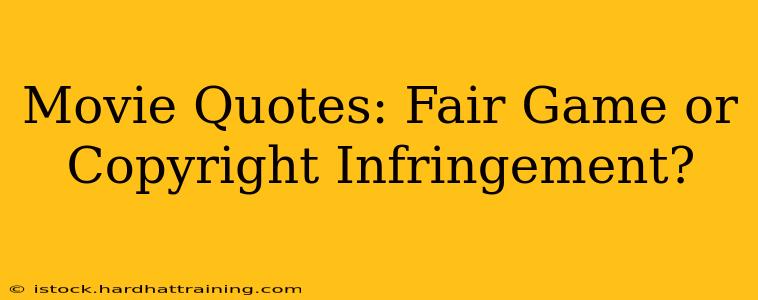Movie quotes are ingrained in our culture. We use them daily, from quoting iconic lines like "Frankly, my dear, I don't give a damn" to referencing more obscure, niche phrases. But where's the line between harmless quoting and copyright infringement? This is a complex legal area, and understanding the nuances is crucial for anyone using movie dialogue in their work.
What is Copyright and How Does it Apply to Movie Quotes?
Copyright protects original works of authorship, including the screenplay of a movie. This protection extends to the dialogue within the script. Essentially, the copyright holder (typically the studio or production company) owns the exclusive rights to reproduce, distribute, and display the movie, including its dialogue. This means using quotes without permission could lead to legal action.
However, the legal landscape isn't as black and white as it might seem. The doctrine of "fair use" allows for limited use of copyrighted material without permission under certain circumstances.
What Constitutes Fair Use of Movie Quotes?
Determining fair use hinges on several factors:
-
Purpose and character of the use: Is the quote used for criticism, commentary, news reporting, teaching, scholarship, or research? Non-commercial uses are generally more likely to be considered fair use. Using a quote in a commercial product or for profit is a much riskier proposition.
-
Nature of the copyrighted work: Is the quoted material factual or creative? Creative works receive broader copyright protection. While a movie is inherently creative, the argument for fair use might be stronger if the quote is a short, factual statement rather than a lengthy, dramatic scene.
-
Amount and substantiality of the portion used: Quoting a single, iconic line is far less likely to be considered infringement than using a significant portion of the movie's dialogue. The more you use, the weaker your fair use argument becomes.
-
Effect of the use upon the potential market: Does using the quote harm the market for the original copyrighted work? This is a crucial factor. If your use of the quote somehow diminishes the value of the movie itself (e.g., by creating a competing product), it’s less likely to be considered fair use.
Can I Use Movie Quotes in My Blog Post?
Using short movie quotes in a blog post, particularly for illustrative purposes or critical analysis, is generally considered acceptable under the fair use doctrine. However, it's crucial to:
- Use only what is necessary: Don't quote excessively.
- Attribute the quote: Always cite the movie and its creators.
- Transform the quote: Use it in a new and creative way, adding your own analysis and commentary.
- Avoid commercial use: If your blog generates revenue through advertising, using significant quotes without permission might put you in a gray area.
What About Using Movie Quotes in My Book or Other Creative Work?
Using movie quotes in a larger creative work like a book or song presents a higher risk. The same fair use factors apply, but the likelihood of infringing on copyright is significantly increased due to the scale of use. Securing permission from the copyright holder is strongly advisable in such cases.
How Can I Get Permission to Use Movie Quotes?
Obtaining permission typically involves contacting the copyright holder, usually the film studio or production company. This process can be time-consuming and may involve fees.
Are there any other exceptions?
While fair use is the primary defense against copyright claims, there might be other limited exceptions depending on your jurisdiction. Consulting with an intellectual property lawyer is always recommended if you're unsure about your usage.
What Happens if I Infringe Copyright?
Copyright infringement can lead to legal action, including hefty fines and legal fees. The consequences can be severe, particularly for commercial use.
This information is for educational purposes only and should not be considered legal advice. Always consult with a legal professional for guidance on specific situations.
